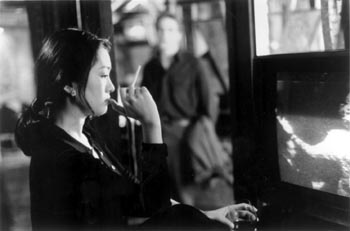Hong Kong Elegy
Lament for a City: Vivian (Gong Li) knows that Hong Kong will never be the same.
Wayne Wang's 'Chinese Box' explores a world that will never be the same
SNAPSHOTS OF A CITY'S transformation are the subject of Wayne Wang's Chinese Box, a fictional look at the Hong Kong hand-over in 1997. The title is appropriate; the film shows unexpected corners and cubbyholes hidden from a first view of the situation.
Jeremy Irons plays John, an English expatriate business journalist who had come to hustle the East and failed. Director Wayne Wang introduces John's backstory in a deliciously quick stroke. At a New Year's Eve party, John is asked by an acquaintance to autograph a book he had written, How to Make Money in Asia. John signs his name, after crossing out "Make" on the title page and scrawling in "Lose." The following day's hangover strikes John so hard that he collapses; a trip to the doctor indicates that he is actually suffering from leukemia and only has half a year left at best.
"I wonder if I can hold out longer than the British," mohn muses, deciding that his last news story will focus on the end of Hong Kong as a Western possession. But John can't escape from his own troubles through writing. He has a wretched, hopeless romance with Vivian (Gong Li), a bartender from mainland China who is set to marry a stodgy businessman who has been stringing her along.
John is diverted from this heartache by a young girl named Jean (Maggie Cheung) whom he spies on the streets. Her face is swaddled by a muffler, which hides a gray scar the size of a grapefruit on her left cheek. Jean's hidden story becomes associated with the mystery of the city itself, which John tries to unravel in the time he has left.
It is a pleasure to see some first-rate actors breaking out of their usual molds. Irons, with so many detached, supercilious characters in his résumé, shows unexpected integrity and warmth. Likewise, Li, who always seems doomed to some awful fate in the last reel of her Chinese films, survives here, displaying humor, sensuality--and even a little imitation of Marlene Dietrich as Vivian watches a scene from the 1948 Billy Wilder film A Foreign Affair.
Cheung climbs farther out of the morass of action movies that made her famous while hampering her as an actress. She's a stunningly tough gamin, but there's so much more to Cheung than just toughness. She evinces so much intelligence and volatility that she outshines any other actress of the year to date.
As a sponging chum of John's, Ruben Blades gives Chinese Box warmth and comic relief. No doubt about it, Blades is a man you'd want by your deathbed. His acoustic performance of Ry Cooder, John Hiatt and James Dickenson's corrido "Across the Borderline" may be about the Mexican/U.S. border, but it fits succinctly into a film about Hong Kong.
Richard von Busack inteviews director Wayne Wang.
THE FILM is a breakthrough for Wang. The improvisational looseness of Smoke and Blue in the Face is developed further, but the subject matter is more important. Wang's approach to John's death is metaphorical rather than tragic; he aims more for a memorial mood than for tears.
Chinese Box, however, is too exciting for tears. It's thrilling to see a movie made by a humanist who believes that there is no such thing as the unknowable, not even in China. John, though white, has as good a chance as anyone to guess at the heart of Hong Kong, symbolized here by the rubylike, still-beating heart of a cut-open fish at the market.
Making a story about losing the city he grew up in, Wang records the street markets that are soon to be closed down by the new government. He also photographs another memento mori: the terrifying jet approaches to Hong Kong, during which the planes swoop dangerously close to the rooftops. (Now that the new airport has been opened, these flyovers have ended.)
The millennium is almost upon us, but there hasn't been much in the way of genuine millennial filmmaking--nothing that looks particular to the anxieties and hopes of a new eon. Chinese Box doesn't have the spectacular bang of the upcoming meteor movies, which is what I suppose will pass for fin de siècle art, but this unexpectedly deep film does convey a sense of ending and transformation, of the supposedly impossible blending of East and West that will be one of the great occurrences of the next century.
Although Chinese Box is a series of collaborations, first with novelist Paul Theroux and later with the eminent screenwriter Jean-Claude Carriere (collaborator with Buñuel and Louis Malle), it doesn't feel like the product of committee work. Ultimately, there's even a type of happy ending. John finds his connection with the city he lived in, before he expires within its embrace.
[ San Jose | Metroactive Central | Archives ]
![]()

Chan Kam Tseun![[line]](/gifs/line.gif)
![[line]](/gifs/line.gif)
Chinese Box (R; 100 min.), directed by Wayne Wang, written by Jean-Claude Carriere and Larry Gross, photographed by Vilko Filac and starring Jeremy Irons, Gong Li and Maggie Cheung.
From the May 7-13, 1998 issue of Metro.
![[Metroactive Movies]](/movies/gifs/movies468.gif)